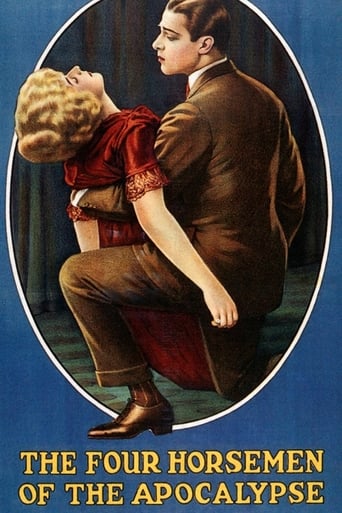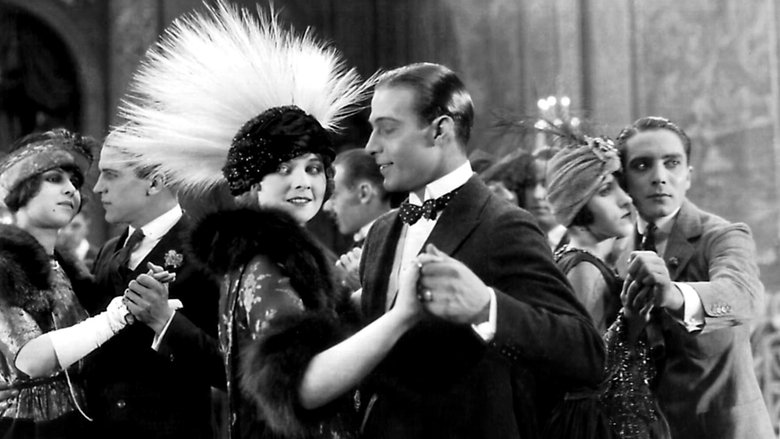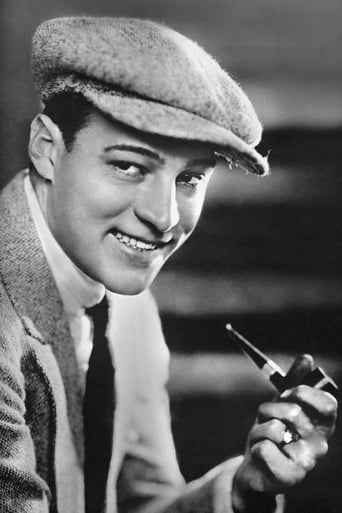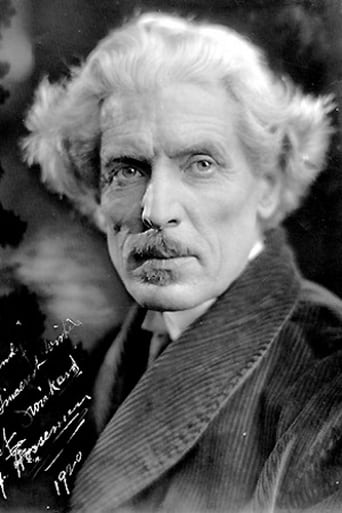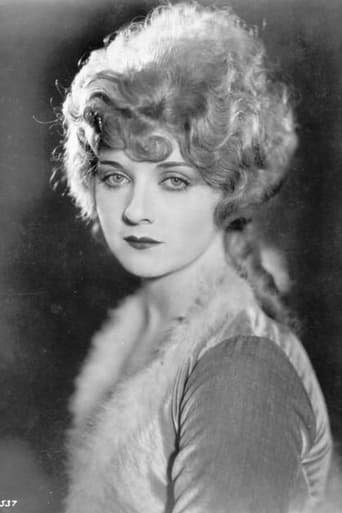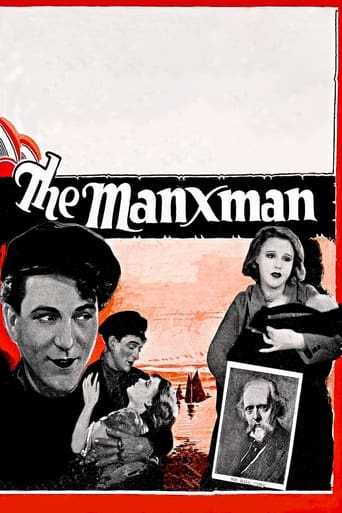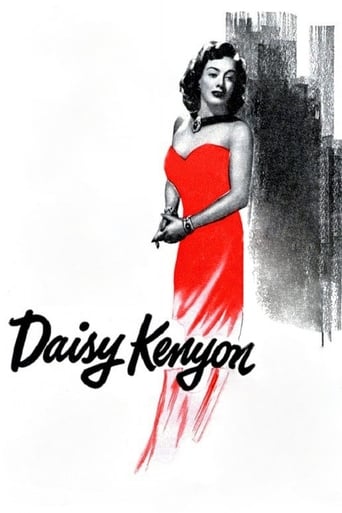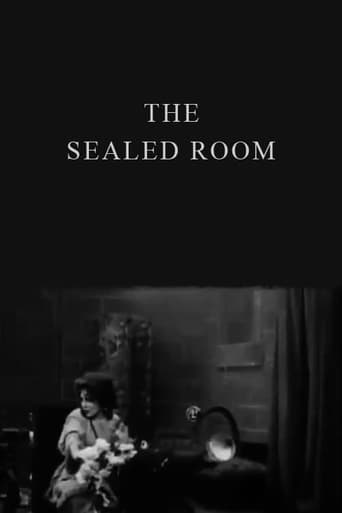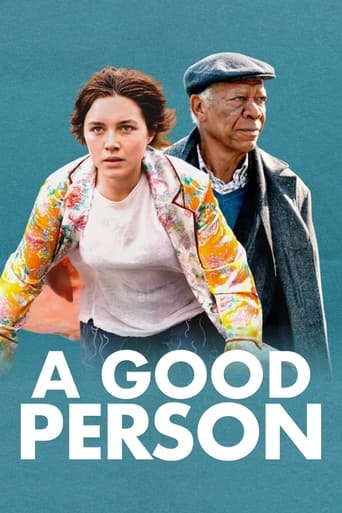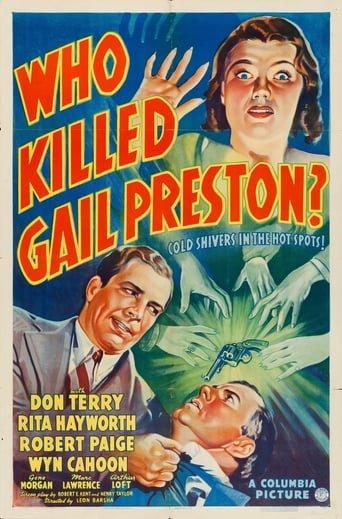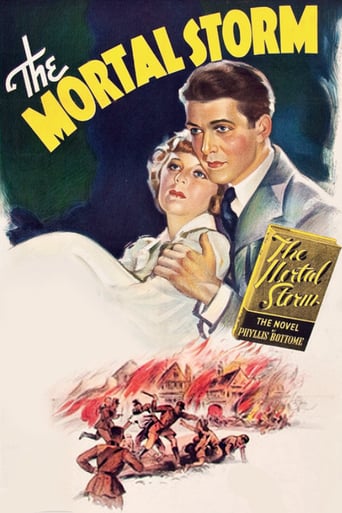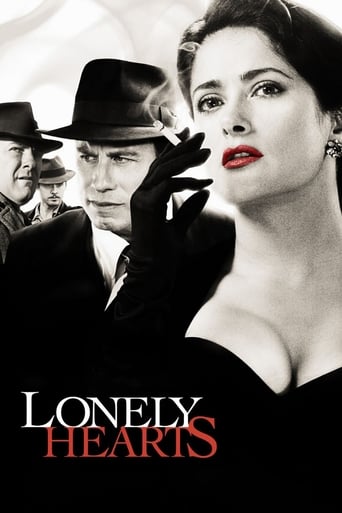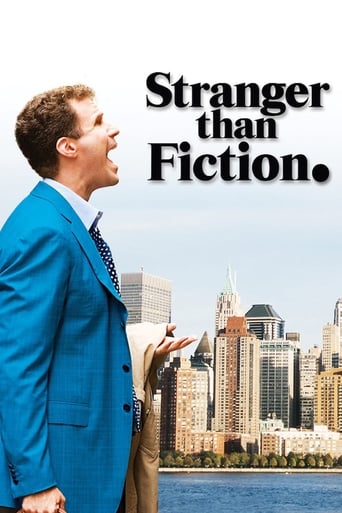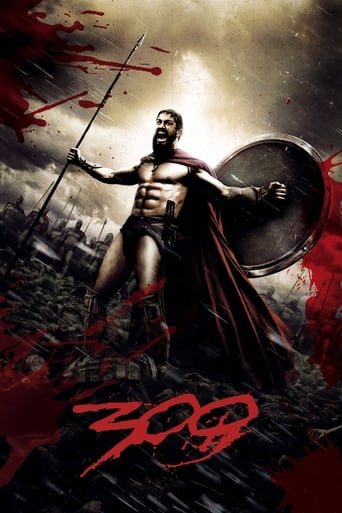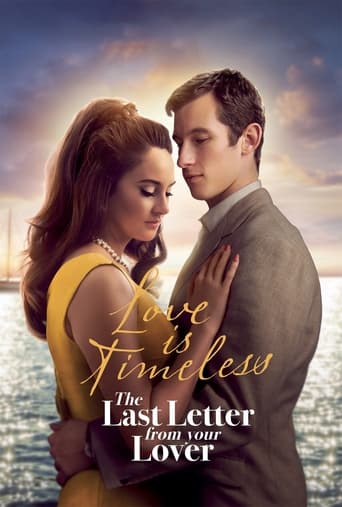The Four Horsemen of the Apocalypse (1921)
Set in the years before and during World War I, this epic tale tells the story of a rich Argentine family, one of its two descending branches being half of French heritage, the other being half German. Following the death of the family patriarch, the man's two daughters and their families resettle to France and Germany, respectively. In time the Great War breaks out, putting members of the family on opposing sides.
Watch Trailer
Free Trial Channels
Cast


Similar titles
Reviews
Surprisingly incoherent and boring
Absolutely Fantastic
A movie that not only functions as a solid scarefest but a razor-sharp satire.
I enjoyed watching this film and would recommend other to give it a try , (as I am) but this movie, although enjoyable to watch due to the better than average acting fails to add anything new to its storyline that is all too familiar to these types of movies.
1st watched 10/20/2013 - 4 out of 10(Dir-Rex Ingram): Heavy handed anti-war movie comes across very one-sided as far as the perspective on a war between Germany and France in this epic family drama, love story & war movie wrapped into one package. Rudolph Valentino plays a son of a Parisian who departed to Argentina fleeing the country from an earlier conflict, but returns after his grand-father's demise. The son has a weakness for the woman-folk and becomes involved with the wife of one of his German cousins causing scandal between the two families. He is an artist who lives off his father's money until he decides to join the cause of the war. The four horsemen come into play as an allegory against the biblical reference(referred to in the movie as an old book) in Revelations where each horsemen represents a different side of the results of war activity and the movie does some special effects introducing these horsemen at different points of the movie. Rudolph's father hordes antiques in an old castle in France, but it's destroyed by the German's in an almost naturally occurring guilty verdict on his original escape from the draft. This is a departure from the rest of the movie's otherwise emotionally pointed view about the negative perspective on war. There is not much detail given to the war only that Germany is the conqueror and France takes the blunt of their blows. I believe the piece would have been stronger if the motivations of both sides would have been revealed better. The romance in the story is lessened and seems to just be an opportunity to show off the good looking Valentino's occasional dancing with the ladies. I'm sure the actual re-percussions of World War I prompted the novel and the movie and this played real well to packed houses in America when it first came out, but doesn't play as well to the current age. Overall, I just didn't see that the movie made it's point very effective -- which appeared to be that war should be avoided. In my opinion it wasn't bold enough in it's assessment.
"She discovered me. Anything I have accomplished I owe to her, to her judgment, to her advice and to her unfailing patience and confidence in me," Rudolph Valentino said about an eminent woman in both his career and in the Hollywood of the early 1920s, the first female film executive June Mathis (1887-1927). SOME BACKGROUND INFORMATION: It was Ms Mathis who took the key initiative in making one of the cult movies of the silent era, in convincing the studio Metro to hire Rex Ingram on as a director, in discovering the screen idol, Rudolph Valentino. And, perhaps, the latest aspect is the one that has remained associated with this movie. What is more, Ingram, an eminent director of his day, clearly appears to have given, beside Ms Mathis, a free ticket to stardom for the king of tango, for the cherished boy of extravagance."HAIL VALENTINO" one could shout out... Indeed, it seems that most aspects appear to be shadowed by the magnetic presence of the young handsome actor, his genuine performance as youthful Julio whose heart was devoted to tango and whose charm to women. It is clear that the role began the widespread "Valentino mania," which proves the fact that there were hardly any other actors in the history of cinema who, in a short period of time, managed to create a special aura around themselves as intensely as Valentino did. Yet, it would be a serious condensation to claim that the movie is solely a Valentino vehicle.Therefore, NOT SOLELY VALENTINO but lots of aspects, including stunning visuals, beautiful cinematography (great work by John Seitz), grandiose sets, length and the lavish costumes make THE FOUR HORSEMEN an epic proportion silent film, one of the three earliest ones (the two other being D.W. Griffith's 1915 BIRTH OF A NATION and 1916 INTOLERANCE). When I watched the film with my friend, we were entirely mesmerized by the fact that so glorious a motion picture was made as early as in 1921. The impressive number of extras (over 12,000), the glossy sets of the Marne Valley, the beautifully decorated interiors and powerful imagery must have overwhelmed the generation of the silent era viewers. Moreover, what appealed to them even more intensely in 1921 was the content.The POWERFUL CONTENT, based considerably on the novel by Vincente Blasco Ibanez, deals with events that were fresh in the minds of viewers: the WWI (sometimes referred to as the Great War) which had just ended and which was infamous for having brought so much destruction and death to so many people. And here, except for various plots that appear in the content and possible interpretations of "false stereotypes" and clichés, one should be just and state one fact clearly: THE FOUR HORSEMEN is truly one of the most powerful anti-war movies. The truly SYMBOLIC CHARACTER is Tchernoff (Nigel De Brulier) who bases his vision on the theme of four horsemen derived from the Book of Revelation and from the interpretations by Albrecht Duerer, appears to represent human conscience. The focus is clearly put on the Christian faith where there is a strong link between hatred and suffering vs love and peace. The aspect of personal sacrifices, the atonement offered from the depth of one's heart is also memorably manifested here. Consider, for instance, the scene at Lourdes, France.As far as the CAST are concerned, it is, again, not only Valentino who deserves appreciation. I think that wonderful acting is given by many talented actors and actresses who still can make THE FOUR HORSEMEN my cup of tea. It is significant to mention the director's wife, Alice Terry who portrays beautiful Marguerite Laurier in a very subtle manner. Her heart longs for youthful companionship, yet, she chooses to dwell in the joy of self sacrifice by helping others, living for others. Her character represents the way of love that remains in total objection to the way of hatred that war spreads. And isn't her way the only one that may bring relief to suffering humanity? Among other cast, I would make a remark about the aforementioned Nigel De Brulier whose face appears to be particularly mysterious and, for whom, nothing is a mystery. Pomeroy Cannon is also memorable as old Madariaga, the old centaur for whom women were the plague of his existence.All things considered, one could think that the film is too sophisticated and, perhaps, too old to be appreciated nowadays. However, after viewing the movie twice, I say honestly: "It is anything but!" Its legendary role may be a matter of the past only for people who will close themselves in up-to-date technical effects and action. Yet, if you open yourself to the depth of classic motion pictures, to their timeless messages, the legendary role of THE FOUR HORSEMEN OF THE APOCALYPSE shall not pass. You will never forget this film because it touches the universal aspects of human existence.It will constitute a silent tribute to the life circle of humanity, to various stories that begin with joyful "Hooray" at their births and end with sorrowful "R.I.P" at their deaths; yet, the stories above which shines the Miracle of Love.
The Four Horsemen of the Apocalypse was a anti-war silent movie,but a good movie i don't know this exactly that i have seen the whole movie,but it's a good film.the main topic is the world war I. a lot of scenes were in the bar where people drinking vodka or cognac and smoking cigar or cigarette.Rudolph Valentino has been along time ago my big idol with Jimi Hendrix,Elvis Presley,Hulk Hogan and Ice-T. Four Horsemen of the Apocalypse was without a doubt one of the highest grossing silent films ever.and Rudolph Valentino was of course one of the greatest silent movie actors.i am men so i don't have an opinion about his look,but lady's say that was a sex symbol. and of course the famous tango scene is pretty famous scene in movie history.and i personally haven't seen the two sheik movies.
I had always wanted to watch this Silent version of the Vicente Blasco Ibanez novel (who, incidentally, wrote MARE NOSTRUM as well - also filmed by Ingram in 1926), especially since it's considered to be vastly superior to the 1961 Vincente Minnelli remake in color and widescreen - which is a film I've watched quite a few times and which I've actually always liked! Still, now I can't help but agree that the remake is virtually overblown in every department by comparison with the original; the only thing I could find where it improved on the Silent version is the relationship between Julio and his German cousin, which is rather underdeveloped in Ingram's film (though in both versions, the two of them die together).The large-scale production is truly impressive, with settings ranging from rural Argentina to the French aristocracy and the grimy battlefields of World War I - not to mention a striking vision of Hell, with a gigantic fire-breathing demon unleashing the somber and ominous titular figures. The cast is certainly efficient, though some of the familiar names actually only gained popularity years later (Alan Hale, Wallace Beery and Jean Hersholt): Rudolph Valentino was shot to super-stardom with his role of the gigolo who develops a conscience and gives his life for a country which is not even his (a miscast Glenn Ford was certainly no match for him in the remake!); the tango sequence is justly celebrated, but his performance is excellent throughout (again, this might very well constitute his best work). Needless to say, the female lead was played by Ingram's own wife Alice Terry; also worth mentioning is Nigel De Brulier as a gaunt and gloomy exiled Russian who 'sees' the Four Horsemen and predicts the extent of their havoc. Though quite slow-going, the plot is compelling and the handling vivid enough to withstand its hefty 134-minute duration; as a matter of fact, the film is probably the most notable epic 'family saga' since D.W. Griffith's THE BIRTH OF A NATION (1915) which, obviously, had dealt with the American Civil War and its turbulent aftermath.I've watched 6 Rex Ingram films so far and, apparently, the only two surviving titles of his I've yet to catch up with are THE ARAB (1924) and THE GARDEN OF ALLAH (1927); this is possibly the finest of them, however, despite being the oldest - and I'm surprised it still hasn't made it to DVD (from Warners), ideally as a 2-Disc Set in order to include the Sound remake...

